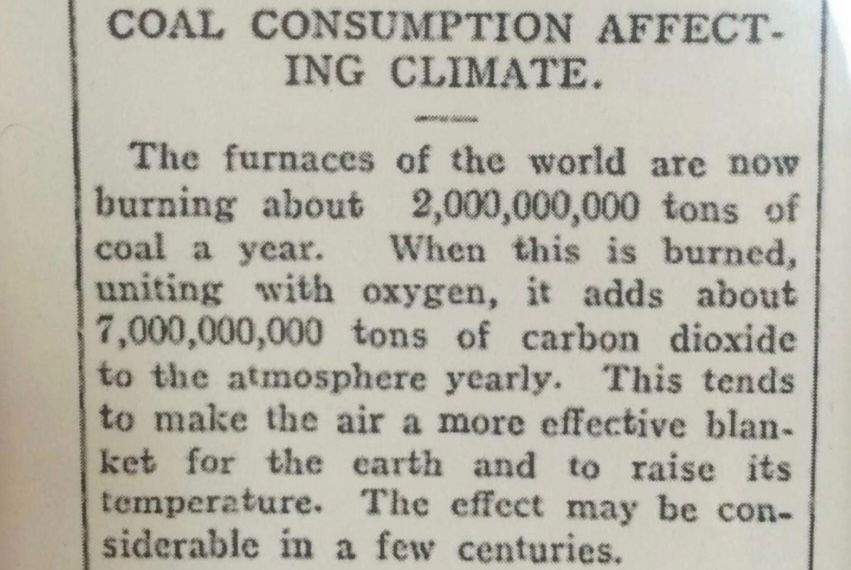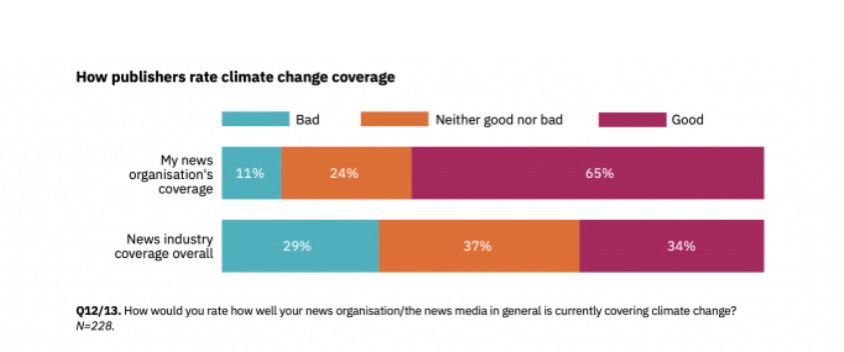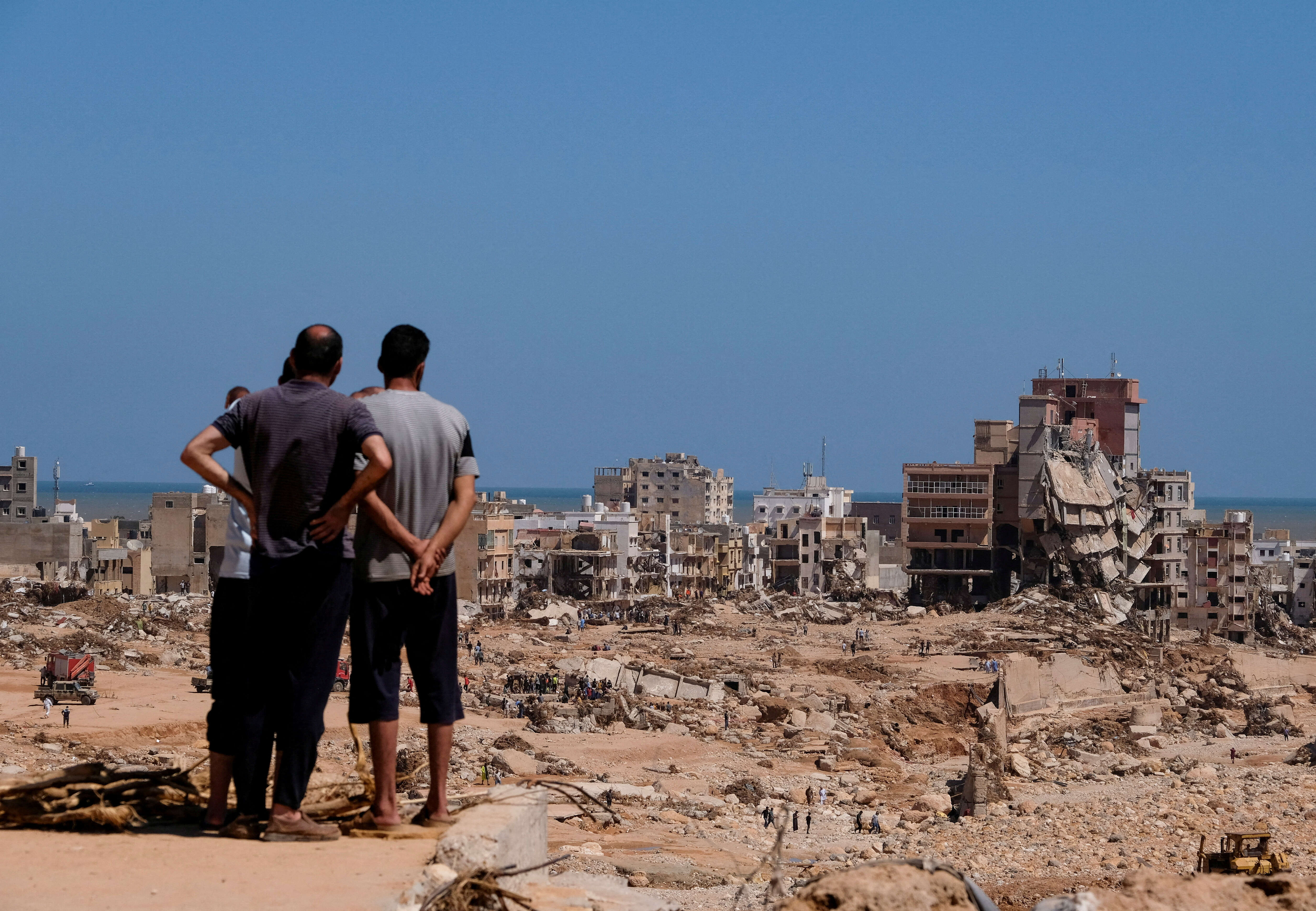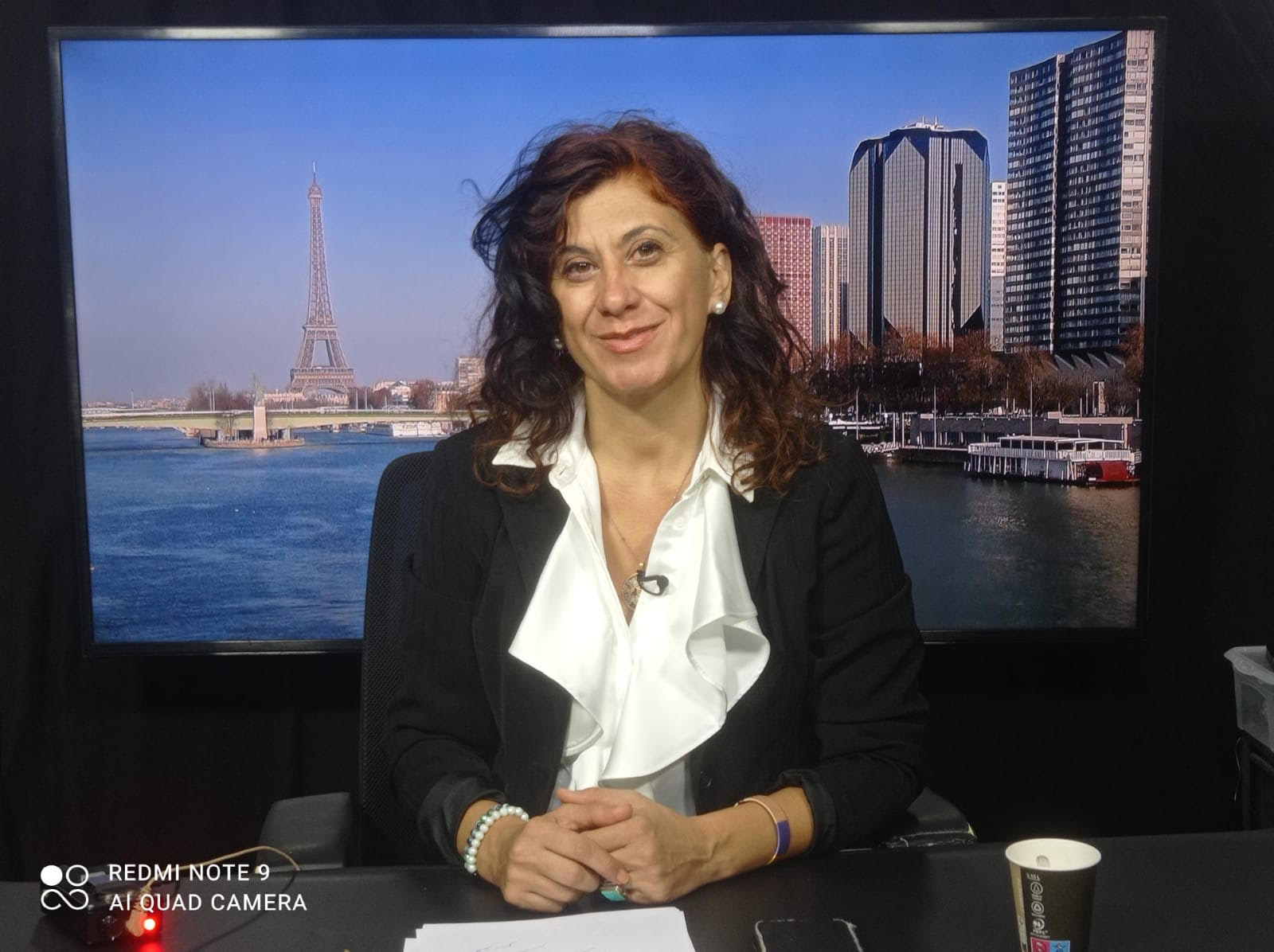يُشكل تغير المناخ تحديًا للبلدان في جميع أنحاء العالم، خاصة في عملية الوعي الجمعي للقضايا المتعلقة بتغير المناخ حيث تُعد وسائل الإعلام مصدرًا مهمًا للمعلومات، لذلك ينبغي السؤال عن أفضل الممارسات التحريرية التي يمكن أن تنشر ثقافة الوعي.
عن النشأة
يعود تاريخ نشأة إعلام المناخ إلى نهاية الستينيات، في غرف التحرير الغربية (1) وهوما يسمى بالصحافة البيئية، ولا ينفصل هذا الظهور عن إنشاء الحركات النقابية الأولى لحماية الطبيعة (2).
ففي فرنسا مثلا، عندما تم إنشاء منظمة الصحفيين والكتاب من أجل الطبيعة والبيئة (JNE في عام 1969) كانوا مرتبطين عضويا بالاتحاد الفرنسي لجمعيات حماية الطبيعة. هذه المنظمة التي ليست حكرا على الصحفيين هي فضاء للتبادل والتفصيل في القضايا البيئية. وخلال الحقبة بين عامي 1955 و1975، ساعد ذلك في ظهور مفهوم جديد للإيكولوجيا تجلى في خلق مساحة للتقارير البيئية التي وجدت لها طريقا للنشر في الصحافة.
لقد ساهم ذلك في خلق الصحافة الاستقصائية، مما أدى إلى ظهور مجموعات من الحملات البيئية - ولا سيما في المملكة المتحدة - أقنعت العديد من غرف الأخبار بأنها بحاجة إلى متخصص يتوافق مع هذه التطورات. وقتها عينت صحيفة نيويورك تايمز أول مراسل بيئي لها في عام 1969، وحذت حذوها وكالات إخبارية أخرى.
شهدت الثمانينيات سلسلة من الكوارث البيئية التي غطتها بعمق مجموعة جديدة من المراسلين المتخصصين (3) بينما كان إعلام المناخ يسلك طريقهُ خاصة في الفترة التي تلت عام 1988، بعد شهادة عالِم ناسا جيمس هانسن أمام الكونجرس في الولايات المتحدة عن علاقة الاحتباس الحراري ودرجة حرارة الأرض، إذ أصبح الموضوع حاضرا في غرف الأخبار (4).
بالنسبة للكثيرين، تستمد معرفة تغير المناخ من التعرض غير المباشر للمعلومات المنقولة عبر وسائل الإعلام وشبكات التواصل الاجتماعي.
صحافة المناخ والانقسام السياسي
إن التعامل مع تغير المناخ يعيد إحياء الجدل القديم حول دور الصحفيين ومشاركتهم في إبراز قضاياه، وكذلك الادعاءات المحايدة مثل تلك المتعلقة بالمصلحة، بين مُشكِك/منكر ومؤيد للتغير المناخي، حيث تبنت الأحزاب المحافظة المؤيدة للثورة الصناعية في جميع أنحاء العالم مبدأ التشكيك في تغير المناخ. ففي 14 آب/ أغسطس نشرت صحيفة نيوزيلندية صغيرة مقالا قصيراً أعلنت فيه أن استخدام الفحم العالمي يؤثر في درجة حرارة كوكبنا بالعلاقة بين غازات الاحتباس الحراري ودرجة حرارة الأرض قبل 150 عاما على الأقل. يومها، كان مثل هذا المقال يعتبر هامشيا ولم يأخذه أحد على محمل الجد.
وظف الكونغرس مؤسسات وسائل الإعلام من أجل التشكيك في هذه العلاقة، وإلى اليوم، تتميز قضية الاحتباس الحراري في الولايات المتحدة الأمريكية، بالتباعد بين الرأي العام والعلمي؛ ففي حين أن الغالبية العظمى من العلماء خلصوا إلى أن الاحتباس الحراري يحدث وأن نسبة كبيرة من العواقب يمكن تفسيرها بالأنشطة البشرية، فإن نصف الجمهور الأمريكي فقط يوافق على ذلك. لأن وسائل الإعلام ساهمت في خلق حالة الشك لدى الجمهور تجاه تغير المناخ، وبالتالي فإن الجمهور يقوم بتقييم أخطار تغير المناخ بشكل خاطئ.
تغير أم أزمة أم كارثة مناخية، أي كلمة تختار لوصف الحقائق؟ نشرت صحيفة الغارديان معجمها المناخي الذي يظهر بوضوح موقف الصحيفة البريطانية: "هذه أزمة وليست تغيرا".
هكذا يصبح الموضوع البيئي – بسهولة - موضوعا للجدل. هنا تكمن القيمة المضافة للصحافة، خاصة في سياق وفرة المعلومات، في محاولة وضع الحقائق في سياقها الحقيقي ونشرها من أجل توعية المواطنين. لذلك لا يمكن أن يكون التعامل مع تغير المناخ بالتراضي وإقناع الجميع، ولكن يجب أن يتخذ شكلا معينا من الالتزام من خلال تلخيص ما هو مقبول علميا.

الخبرة المناخية في غرف الأخبار
لرسم صورة دقيقة عن أسباب وعواقب تغير المناخ، يجب ربطه بصحافة الحلول، ولكن أيضا يجب على غرف الأخبار استدعاء الخبراء لمساعدتهم على التعامل مع الموضوع، خاصة وأن الجمهور يتوقع من وسائل الإعلام والصحفيين تقديم الخبرة على لسان الباحثين والمتخصصين للتعامل مع قضية المناخ.
في تقرير معهد رويترز لعام 2022، أوضح أن هناك "ضعفا جوهريا في الثقافة العلمية، والتدريب في غرف الأخبار. وينبغي هنا تعزيز العلاقات بين غرف الأخبار والمؤسسات الأكاديمية، للمساعدة في بناء فهم أفضل وتقنيات تعليمية أفضل بشأن تغير المناخ، بمعنى أنه يجب تدريسها في الكليات والمعاهد كتخصص قائم الذات.
إشكالية المصطلحات وانقسام الجمهور
تغير أم أزمة أم كارثة مناخية، أي كلمة تختار لوصف الحقائق؟ نشرت صحيفة الغارديان معجمها المناخي الذي يظهر بوضوح موقف الصحيفة البريطانية: "هذه أزمة وليست تغيرا".
بالنسبة للكثيرين، تستمد معرفة تغير المناخ من التعرض غير المباشر للمعلومات المنقولة عبر وسائل الإعلام وشبكات التواصل الاجتماعي. يمكن أن يثير هذا المحتوى مجموعة متنوعة من الاستجابات العاطفية، السلبية الإيجابية، بما في ذلك الغضب والحزن واليأس والخوف والشعور بالذنب. القلق والقلق من الاستجابات الشائعة بشكل خاص. يشار إلى هذه الظاهرة عادة باسم "القلق البيئي" أو "القلق المناخي"، وهي مرتبطة بأعراض مثل نوبات الهلع، وفقدان الشهية، والتهيج، والضعف، واضطراب النوم. من هذا المنظور، يمكن اعتبار تغير المناخ تهديدا للصحة العقلية للسكان على نطاق عالمي محتم (5).
قد تخفِف التغطية الإعلامية لأفضل الممارسات في السلوك المؤيد للبيئة (على المستويين الفردي والمجتمعي) من حدة هذه العواقب.
يظهر تقرير رويترز ديجيتال نيوز 2013 أن ثلث الناشرين يعتقدون أن معالجة وسائل الإعلام لتغير المناخ غير كافية. فأين المشكلة إذا كانت الإرادة موجودة. يمكن أن يكون التعقيد العلمي أو أنه ليس أولوية في عالم مضطرب يعج بالحروب والصراعات، يضاف إلى ذلك أنك تتوجه إلى جمهور منقسم ولا يؤمن جزء كبير منه بهذه التغيرات.
ينبغي تعزيز العلاقات بين غرف الأخبار والمؤسسات الأكاديمية، للمساعدة في بناء فهم أفضل وتقنيات تعليمية أفضل بشأن تغير المناخ، بمعنى أنه يجب تدريسها في الكليات والمعاهد كتخصص قائم الذات.
لذلك فإن التعامل مع الاحتباس الحراري يجب أن يدفعنا إلى تبسيط المعلومة المناخية، فمن المهم تطوير أشكال تثقيفية واضحة تصل للمتابعين، كما يجب التركيز على المسؤولية المتفاوتة للمسؤولين عن الاحتباس الحراري فالدول الصناعية تلوث أكثر من الدول الأخرى. قد يدفع ذلك إلى إقناع الجمهور المتشكك.

إن المعلومات المناخية والبيئية جزء لا يتجزأ من الأخبار المختلفة في وسائل الإعلام الرئيسية وتعد خطوة أولى في التعرف على هذه القضايا. ولكن يجب علينا الآن الانتقال إلى المستوى التالي، لترسيخ العمل التعاوني بين العلماء والصحفيين والجمعيات والباحثين في معالجة الموضوع كأحد الحلول التي يجب مراعاتها. أهمية تغير المناخ وطبيعته الشاملة تنعكس على الطريقة التي نفكر بها في الصحافة اليوم .من المهم توضيح الجانب العالمي والجانب المحلي للظاهرة وإظهار أن نفس الظاهرة يمكن أن يكون لها تأثيرات مختلفة اعتمادا على المناطق الجغرافية، ولكنها ستتأثر جميعا، بشكل مباشر أو غير مباشر. إن الحديث عن الحلول السياسية والفردية في تغطية الاحتباس الحراري بطرق متعددة الحلول هو إستراتيجية مدعومة بمقترحات علمية ستدفع المجتمع المدني إلى تطوير الممارسات في السلوك المؤيد للبيئة على المستويين الفردي والمجتمعي.
المراجع:
1) Hansen A (2020) Sources, strategic communication, and environmental journalism. In: Sachsman D, Valenti J (eds), Routledge Handbook of Environmental Journalism. London, UK: Routledge, pp. 38–51.
2) Les SAINTENY G. (1994), « Les médias français face à l’écologisme », Réseaux, n° 65, p.87-105.
3) Neuzil M (2020) The development of environmental journalism in the Western world. In: Sachsman DB, Valenti JM (eds), Routledge Handbook of Environmental Journalism. London, UK : Routledge, pp. 19–37.
4) Ungar S (1992) The rise and (relative) decline of global warming as a social problem. The Sociological Quarterly 33(4): 483–501.
5) Int J Environ Res Public Health. 2021 Sep; 18(17): 9358.Published online 2021 Sep 4. doi: 10.3390/ijerph18179358PMCID: PMC8431103PMID: 34501946Media Exposure to Climate Change, Anxiety, and Efficacy Beliefs in a Sample of Italian University StudentsDaniela Acquadro Maran* and Tatiana Begotti
MeCCO (MediaClimate Change Observatory (2023) World Newspaper Coverage of Climate Cha












































